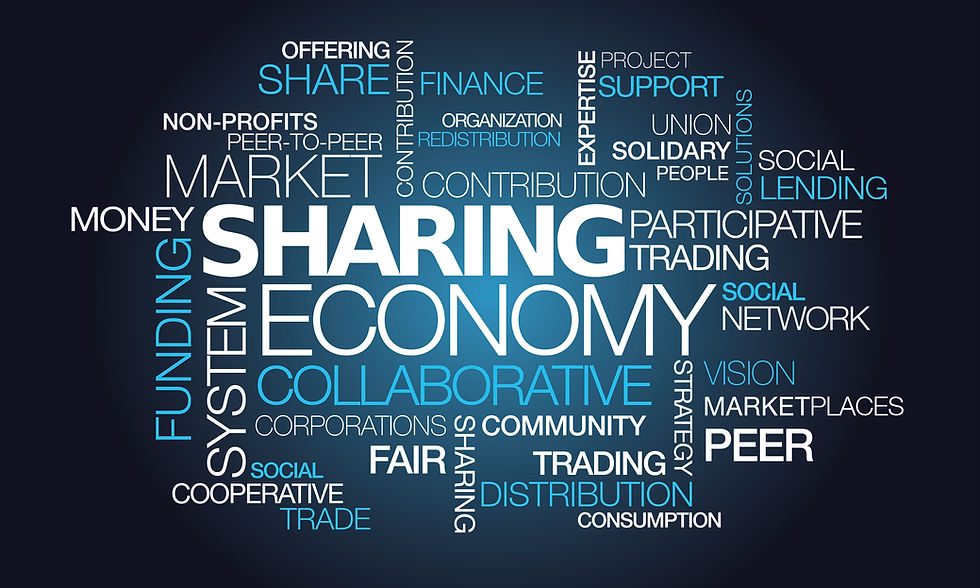The Sharing Economy
- Derek Moore

- Jun 14, 2023
- 4 min read
Introduction
The sharing economy is a phenomenon that has completely changed the way many people think about their lives and businesses. It's also a disruptive trend that may be more than just a fad, but one that could have lasting effects on how we work and live our lives.

Why the sharing economy is growing
The sharing economy is growing because it's a response to the challenges of our time. The need for more efficient, sustainable ways to live and work has never been greater. But so, too, has been the desire for authentic and meaningful experiences that go beyond material goods.
The sharing economy offers solutions to these two issues in one package: it's an economic system that allows people to connect with each other based on shared interests rather than monetary value (like money), giving them access both resources as well as opportunities for community building--all while reducing waste at every turn.
The sharing economy is expected to grow more than 500% by 2025.
As of 2015, the sharing economy was worth $15 billion and is expected to grow exponentially in the coming years. By 2025, it's expected to be worth $335 billion; that's a 500% increase in only 10 years.
The sharing economy has been called a bubble, but it's not.
The sharing economy is not a bubble. It's a long-term trend that will continue to grow, and it's here to stay. The sharing economy is an outgrowth of the internet, and it's also a response to our financial crisis in 2008.
The idea behind the sharing economy is simple: people have something they don't need (like their car, apartment or extra bedroom) and other people want access to those things but don't want them permanently--they just want them for part of their lives, like when they travel or move into a new place. By connecting these two groups together through apps like Airbnb or TaskRabbit (and many more), everyone gets what they want without having any middlemen take commission fees along the way!
A simple way to understand the sharing economy
The sharing economy is a broad term that encompasses many different types of transactions, from swapping clothes with friends to renting out your house on Airbnb. To understand it, first you need to know what the definition of "sharing economy" is.
There are many examples of how people have used the sharing economy:
● You can rent out your car for money if it's not being used by anyone else at that time. This way, someone else gets to use it without having their own vehicle and you get paid for letting them use yours!
● If you're staying at someone's house while they're away and want some privacy but don't want them around all day while doing so--or vice versa--you could trade houses with someone else who has similar needs (and wants).
How is it changing work?
The sharing economy is changing the way we work. It is a movement that has been gaining momentum for years, but it's still early days. The changes we're seeing now are only the beginning of what's to come as more and more people embrace new ways of earning a living and accessing capital.
The nature of work is shifting from jobs with employers to independent contractors who sell their services directly to customers through platforms like Upwork or TaskRabbit. In some cases, this has led to disputes about whether workers should be considered employees or contractors (and therefore entitled to certain benefits).
Relationships between workers and employers are also evolving as more people look outside traditional employment opportunities in order to earn an income on their own terms -- including those who choose not to work at all because they can make enough money with side hustles like selling stuff on eBay or driving passengers around town via Lyft or Uber pickup service!
What impact has this had on productivity?
The sharing economy has had a significant impact on productivity. Technology, data, automation and new business models are all contributing factors.
The sharing economy is a disruptive trend, but it also has the potential for greater efficiency and better outcomes for individuals and businesses.
The sharing economy is a disruptive trend, but it also has the potential for greater efficiency and better outcomes for individuals and businesses.
The sharing economy is changing work by providing new ways of exchanging goods and services online. It may be more efficient than traditional models of commerce because it allows people to sell their time or possessions without having to own them directly (e.g., peer-to-peer car rental). The sharing economy can also improve access to jobs that were previously unavailable due to transportation, location or other factors (e.g., Uber). Finally, some argue that this type of marketplace helps people build assets faster than traditional businesses by allowing them access capital through crowdsourcing platforms like Kickstarter
Conclusion
The sharing economy is a disruptive trend, but it also has the potential for greater efficiency and better outcomes for individuals and businesses. It may help us solve our most pressing problems in areas like transportation and housing, while also creating new opportunities for people who want to earn money by providing services or renting out their belongings on platforms like Airbnb or Lyft. The key will be finding ways to ensure that everyone benefits from this transformation--and not just those with the most money




Comments